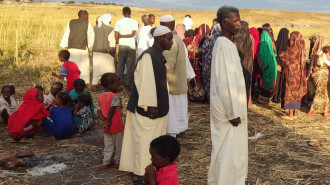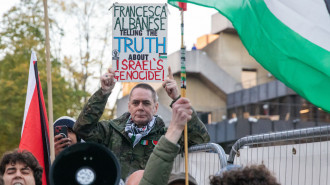
Zawya: Meeting the demands of film lovers thirsty for experimental Arab cinema

The BFI’s film season The Time is New: Selections from Contemporary Arab Cinema presents diverse films from all over the Arab world. Ranging from strained family ties to national crises, the programme centres on Arab life, art, culture, individual and collective challenges. With selected titles also available on BFI Player Subscription, the season’s diverse programme ensured its success.
Running from 27 August-5 October, The Time is New is programmed by Youssef Shazli and Alia Ayman, co-founders of the Cairo-based leading arthouse cinema and distributor Zawya.
Shazli and Ayman also run the film festival and they are in charge of the distribution of films. Ayman’s BA is in psychology but her love for making films persuaded her to take a different route. She is currently doing a PhD in visual anthropology.
The programme’s abstinence from promoting a specific theme makes it all the more enjoyable; it is a selection of good Arab films. Shazli and Ayman joined The New Arab from Cairo and New York to talk about The Time is New and Arab arthouse cinema.
A cinema for films not shown on cinema
The Arabic word Zawya [Corner] endearingly describes the hub for a niche of film connoisseurs and audiences who are eager for something different from mainstream cinema.
Founded in 2014, Zawya is one of Egypt’s first arthouse cinemas. Its vital mission was to provide an alternative to commercial films and to meet the demands of a growing audience that is thirsty for independent, experimental cinema.
In many ways, Zawya pays homage to cinema by prioritising the love of films over commercial gains. “Zawya was conceived as an idea in 2013 when both Alia and I were in Cairo. We have some very different backgrounds. We created Zawya as a space for independent cinema,” Shazli told The New Arab.
"Zawya was conceived as an idea in 2013 when both Alia and I were in Cairo. We have some very different backgrounds. We created Zawya as a space for independent cinema"
For many years, Egypt was the minaret of Arab cinema, in every Arab household, there is a staple tradition of watching Egyptian films and Musalsalat (TV Series). Both the production of films and the tradition of going to the cinema seem to have been lowered in the past few years. Despite the growing interest in arthouse films, Zawya remains the only arthouse cinema in a city of over 20 million people.
The Egyptian production and distribution company Misr International Films (FIM) founded by esteemed filmmaker Youssef Chahine supported Zawya at its earliest stages. Both Shazli and Ayman used to attend its festival and they both worked at it, at some point. “We did not start from scratch, we had some support from ‘the mother company’ if we can call it that, and we still do. This helped us a lot because we were also very young when we started so it was very important for us in terms of navigating bureaucracy, having the office space and access to networks… we were very well supported in that sense,” explains Ayman.
Today, Zawya and its audience are sustaining each other, both are growing together, Shazli rejoices in commenting: “Every day we see people we haven’t seen at Zawya before.”
Commenting on the problem of censorship, Ayman explains that arthouse films and festivals sometimes have an easier time navigating censorship, unlike commercial films. “There are two kinds of censorship, the official censorship and there are things that people simply do not want to see.
"Censorship is definitely an issue, but it is not one that I think about a lot in its sense of centralised censorship, because artists all over the world are censored somehow whether by the market, the funders, or their own selves. I think absolute freedom of expression does not exist anywhere in the world," Ayman tells The New Arab.
"Artists all over the world are censored somehow whether by the market, the funders, or their own selves. I think absolute freedom of expression does not exist anywhere in the world"
The Time is New
Commenting on Zawya’s selection of films, Shazli that it ranges “from experimental cinema to Oscar-nominated films and everything in between”.
The programme of BFI’s film season also fits the description. It introduces tremendously talented new filmmakers from the Arab world without pegging the season to a specific theme. Commenting on the programme’s rich diversity, Ayman specifies: “The diversity is there in films because it is there in reality.”
“The diversity is there in films because it is there in reality”
From acute dehumanisation to the glorious celebration of communal human values, the program was a delight. Ayten Amin’s film Souad (2021) was the highlight of the season, but several other films had garnered accolades worldwide.
Read The New Arab's review of Souad here:
Abou Leila (2019) is a philosophical surrealist cri de cœur that reinterprets the decade of national violence in Algeria by visualising post-traumatic disorder. The film is disorienting to watch; it deliberately creates a deep and brutal sense of plunging into a nightmare.
Elia Suleiman’s It Must Be Heaven (2019) is a light-hearted journey of absurdist observation that expands through different continents and explores different cultures. Suleiman’s signature ‘present absence’ satirizes the duplicitous feelings of belonging and alienation. The film shifts the focus to experiencing the globe through Palestinian eyes.
The Man Who Sold His Skin (2020) written and directed by the Tunisian filmmaker Kaouther Ben Hania, is a heartbreaking masterpiece. The film’s aesthetic beauty is almost equal to the agony of the Syrian refugees that the film portrays. The film’s protagonist Sam Ali (Yahya Mahayni) becomes a persona non grata after he turns into a commodity to be sold and transported. Selling his back as a canvas to an artist and agreeing to be displayed in museums as an artwork, Sam goes through the disappearance of personhood. The Man Who Sold His Skin was released in cinemas on September 24.
Read The New Arab's review of The Man Who Sold His Skin here:
Let’s Talk (2019) directed by Marianne Khoury follows four different generations of the women in Youssef Chahine’s family. Almost a decade in the making, the film opens the door to the lives of a cinematic family.
This fall, the BFI brought both emerging and prominent Arab talent to UK screens in a beautiful celebration of Arab Cinema.
The Time is New: Selections from Contemporary Arab Cinema is at BFI Southbank and on BFI Player from 27 August-5 October. Tickets are on sale now at bfi.org.uk/whatson
Ouissal Harize is a UK based researcher, cultural essayist, and freelance journalist.
Follow her on Twitter: @OuissalHarize
![Souad [Ayten Amin] Souad [Ayten Amin]](/sites/default/files/styles/large_1_1/public/media/images/88244078-C563-4A46-A481-A252E0FCD972.jpg?h=d1cb525d&itok=30Dayf1_)







